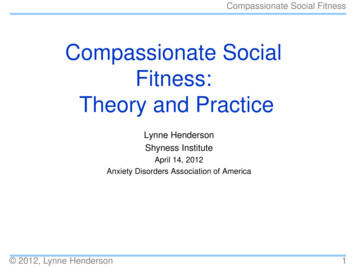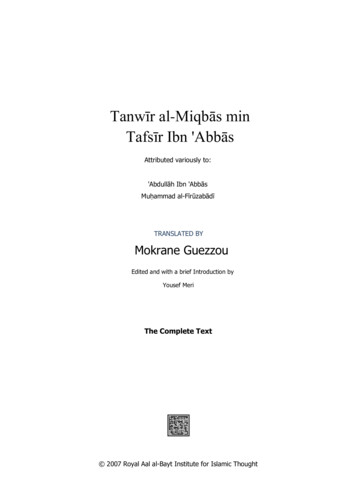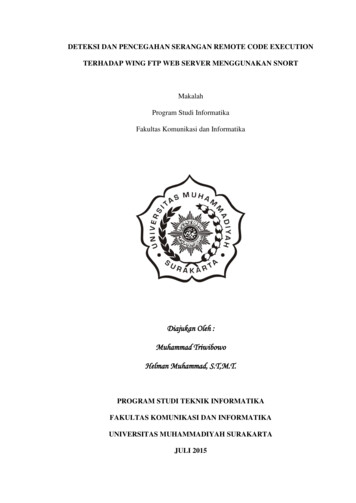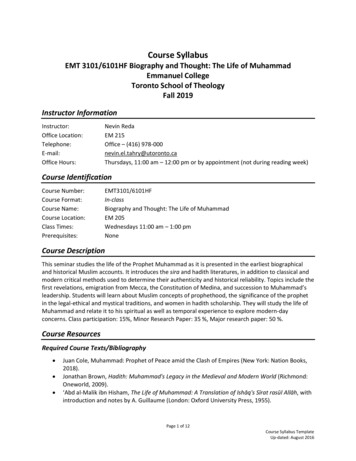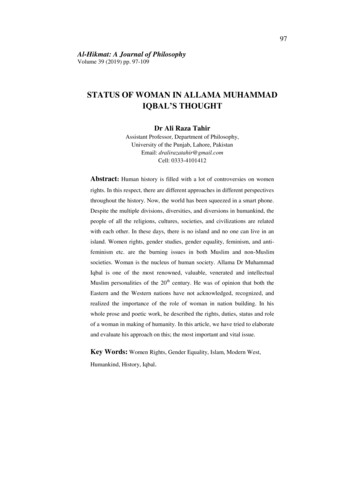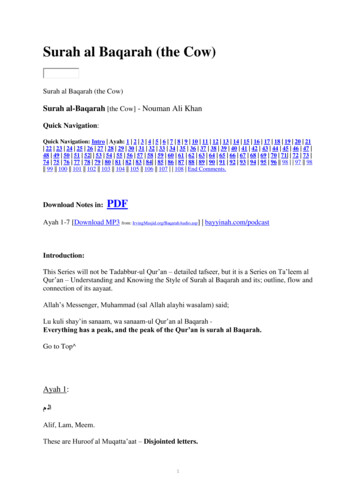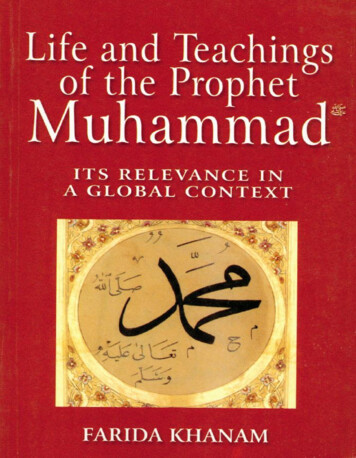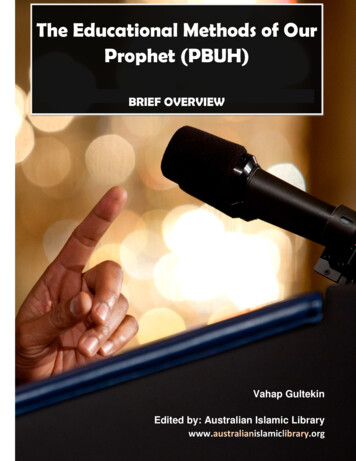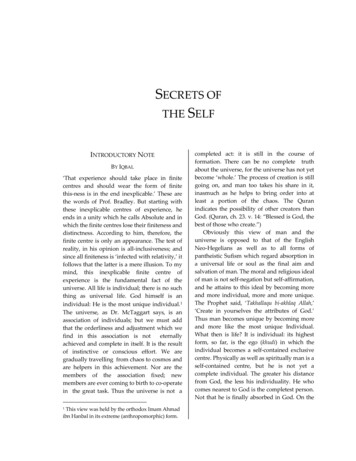
Transcription
SECRETS OFTHE SELFINTRODUCTORY NOTEBY IQBAL‘That experience should take place in finitecentres and should wear the form of finitethis-ness is in the end inexplicable.’ These arethe words of Prof. Bradley. But starting withthese inexplicable centres of experience, heends in a unity which he calls Absolute and inwhich the finite centres lose their finiteness anddistinctness. According to him, therefore, thefinite centre is only an appearance. The test ofreality, in his opinion is all-inclusiveness; andsince all finiteness is ‘infected with relativity,’ itfollows that the latter is a mere illusion. To mymind, this inexplicable finite centre ofexperience is the fundamental fact of theuniverse. All life is individual; there is no suchthing as universal life. God himself is anindividual: He is the most unique individual.1The universe, as Dr. McTaggart says, is anassociation of individuals; but we must addthat the orderliness and adjustment which wefind in this association is noteternallyachieved and complete in itself. It is the resultof instinctive or conscious effort. We aregradually travelling from chaos to cosmos andare helpers in this achievement. Nor are themembers of the association fixed; newmembers are ever coming to birth to co-operatein the great task. Thus the universe is not aThis view was held by the orthodox Imam Ahmadibn Hanbal in its extreme (anthropomorphic) form.1completed act: it is still in the course offormation. There can be no complete truthabout the universe, for the universe has not yetbecome ‘whole.’ The process of creation is stillgoing on, and man too takes his share in it,inasmuch as he helps to bring order into atleast a portion of the chaos. The Quranindicates the possibility of other creators thanGod. (Quran, ch. 23. v. 14: ‚Blessed is God, thebest of those who create.‛)Obviously this view of man and theuniverse is opposed to that of the EnglishNeo-Hegelians as well as to all forms ofpantheistic Sufism which regard absorption ina universal life or soul as the final aim andsalvation of man. The moral and religious idealof man is not self-negation but self-affirmation,and he attains to this ideal by becoming moreand more individual, more and more unique.The Prophet said, ‘Takhallaqu bi-akhlaq Allah,’‘Create in yourselves the attributes of God.’Thus man becomes unique by becoming moreand more like the most unique Individual.What then is life? It is individual: its highestform, so far, is the ego (khudi) in which theindividual becomes a self-contained exclusivecentre. Physically as well as spiritually man is aself-contained centre, but he is not yet acomplete individual. The greater his distancefrom God, the less his individuality. He whocomes nearest to God is the completest person.Not that he is finally absorbed in God. On the
4 Collected Poetical Works of Iqbalcontrary, he absorbs God into himself.2 Thetrue person not only absorbs the world ofmatter by mastering it; he absorbs GodHimself into his ego by assimilating Divineattributes. Life is a forward assimilativemovement. It removes all obstructions in itsmarch by assimilating them. Its essence is thecontinual creation of desires and ideals, and forthe purpose of its preservation and expansionit has invented or developed out of itselfcertain instruments, e.g., senses, intellect, etc.,which help it to assimilate obstructions. Thegreatest obstacle in the way of life is matter,Nature; yet Nature is not evil, since it enablesthe inner powers of life to unfold themselves.The ego attains to freedom by the removalof all observations in its way. It is partly free,partly determined3, and reaches fuller freedomby approaching the Individual, who is mostfree—God. In one word, life is an endeavourfor freedom.The ego and continuation of personalityIn man the centre of life becomes an ego orperson. Personality is a state of tension and cancontinue only if that state is maintained. If thestate of tension is not maintained, relaxationwill ensue. Since personality, or the state oftension, is the most valuable achievement ofman, he should see that he does not revert to astate of relaxation. That which tends tomaintain the state of tension tends to make us2Maulana Rumi has very beautifully expressed thisidea. The Prophet, when a little boy, was once lostin the desert. His nurse Halima was almost besideherself with grief but while roaming the desert insearch of the boy she heard a voice saying:‘Do not grieve he will not be lost to thee;Nay, the whole world will be lost in him.’The true individual cannot be lost in the world; it isthe world that is lost in him. I go a step further andsay, prefixing a new half-verse to a hemistich ofRumi:In his will that which God wills becomeslost;‘How shall a man believe this saying?’‛According to the saying of the Prophet, ‘The trueFaith is between predestination and free-will.’‛3immortal. Thus the idea of personality gives usa standard of value: it settles the problem ofgood and evil. That which fortifies personalityis good, that which weakens it is bad. Art,4religion, and ethics must be judged from thestand-point of personality. My criticism ofPlato is directed against those philosophicalsystems which hold up death rather than life astheir ideal—systems which ignore the greatestobstruction to life, namely, matter, and teachus to run away from it instead of absorbing it.As in connexion with the question of thefreedom of the ego we have to face theproblem of matter, similarly in connexion withits immortality we have to face the problem oftime. Bergson has taught us that time is not aninfinite line (in the spatial sense of the word‘line’) through which we must pass whetherwe wish it or not. This idea of time isadulterated. Pure time has no length. Personalimmortality is an aspiration: you can have it ifyou make an effort to achieve it. It depends onour adopting, in this life modes of thought andactivity which tend to maintain the state oftension. Buddhism, Persian Sufism and alliedforms of ethics will not serve our purpose. Butthey are not wholly useless, because afterperiods of great activity we need opiates,narcotics, for some time. These forms ofthought and action are like nights in the daysof life. Thus, if our activity is directed towardsthe maintenance of a state of tension, the shockof death is not likely to affect it. After deathThe ultimate end of all human activity is Life—glorious, powerful, exuberant. All human art mustbe subordinated to this final purpose, and thevalue of everything must be determined inreference to its life-yielding capacity. The highestart is that which awakens our dormant will-forceand braves us to face the trials of life manfully. Allthat brings drowsiness and makes us shut our eyesto reality around, on the mastery of which aloneLife depends, is a message of decay and death.There should be no opium-eating in Art. Thedogma of Art for the sake of Art is a cleverinvention of decadence to cheat us out of life andpower. (‘Our Prophes's Criticism of ContemporaryArabian Poetry’ in The New Era, 1916, p. 251)4
Secrets of the Self 5there may be an interval of relaxation, as theQuran speaks of a barzakh, or intermediatestate, which, in the case of some individuals,will last until the Day of Resurrection (Quran,ch. 23, v. 102). Only those egos will survive thisstate of relaxation who have taken good careduring the present life. Although life abhorsrepetition in its evolution, yet on Bergson’sprinciples the resurrection of the body too, asWildon Carr says, is quite possible. Bybreaking up time into moments we spatialise itand then find difficulty in getting over it. Thetrue nature of time is reached when we lookinto our deeper self. Real time is life itselfwhich can preserve itself by maintaining that.particular state of tension (personality) which ithas so far achieved. We are subject to time solong as we look upon time as somethingspatial. Spatialised time is a fetter which lifehas forged for itself in order to assimilate thepresent environment. In reality we aretimeless, and it is possible to realise ourtimelessness even in this life. This revelation,however, can be momentary only.The education of the egoThe ego is fortified by love. This word is usedin a very wide sense and means the desire toassimilate, to absorb. Its highest form is thecreation of values and ideals and theendeavour to realise them. Love individualisesthe lover as well as the beloved. The effort torealise the most unique individualityindividualises the seeker and implies theindividuality of the sought, for nothing elsewould satisfy the nature of the seeker. As lovefortifies the ego, asking weakens it. All that isachieved without personal effort comes underasking. The son of a rich man who inherits hisfather's wealth is an ‘asker,’ or beggar; so isevery one who thinks the thoughts of others.Thus, in order to fortify the ego we shouldcultivate love, i.e. the power of assimilativeaction, and avoid all forms of ‘asking, i.e.inaction. The lesson of assimilative action isgiven by the life of the Prophet, at least to aMohammedan. In another part of the poem Ihave hinted at the general principles of Muslimethics and have tried to reveal their meaning inconnexion with the idea of personality. Theego in its movement towards uniqueness hasto pass through three stages:(a) Obedience to the Law(b) Self-control, which is the highest form ofself-consciousness or ego-hood(c) Divine vicegerencyThis divine vicegerency is the third and laststage of human development on earth. Thevicegerent is the vicegerent of God on earth.He is the completest ego, the goal ofhumanity,5 the acme of life both in mind andbody; in him the discord of our mental lifebecomes a harmony. This highest power isunited in him with the highest knowledge. Inhis life, thought and action, instinct and reason,become one. He is the last fruit of the tree ofhumanity, and all the trials of a painfulevolution are justified because he is to come atthe end. He is the real ruler of mankind; hiskingdom is the kingdom of God on earth. Outof the richness of his nature he lavishes thewealth of life on others, and brings themnearer and nearer to himself. The more weadvance in evolution, the nearer we get to him.In approaching him we are raising ourselves inthe scale of life. The development of humanityboth in mind and body is a conditionprecedent to his birth. For the present he is amere ideal; but the evolution of humanity istending towards the production of an idealrace of more or less unique individuals whowill become his fitting parents. Thus theKingdom of God on earth means thedemocracy of more or less unique individuals,presided over by the most unique individualpossible on this earth. Nietzsche had a glimpseof this ideal race, but his atheism andaristocratic prejudices marred his wholeconception.‛6Man already possesses the germ of vicegerency asGod says in the Quran (ch. 2. v. 28): ‚Lo! I willappoint a khalifa (vicegerent) on the earth.‛6 Nicholson’s Note—Writing of ‘MuslimDemocracy’ in The New Era, 1916, p. 251, Iqbal says:‚The Democracy of Europe—overshadowed by5
6 Collected Poetical Works of IqbalSECRETS OF THE SELFBut yester-eve a lamp in hand7The Shaykh did all the city span,Sick of mere ghosts he sought a man,But could find none in all the land.‚I Rustam or a Hyder seekI’m sick of snails, am sick,‛ he said,‚There’s none,‛ said I. He shook his head,‚There’s none like them, but still I seek.‛—RumiPrologueWhen the world-illuming sun rushed uponNight like a brigand,My weeping bedewed the face of the rose.My tears washed away sleep from the eye ofthe narcissus,My passion wakened the grass and made itgrow.The Gardener tried the power of my song,He sowed my verse and reaped a sword.In the soil he planted only the seed of mytearsAnd wove my lament with the garden, aswarp and woof.Tho’ I am but a mote, the radiant sun is mine:socialistic agitation and anarchical fear—originatedmainly in the economic regeneration of Europeansocieties. Nietzsche, however, abhors this ’rule ofthe herd’ and, hopeless of the plebeian, he bases allhigher culture on the cultivation and growth of anAristocracy of Supermen. But is the plebeian soabsolutely hopeless? The Democracy of Islam didnot grow out of the extension of economicopportunity; it is a spiritual principle based on theassumption that every human being is a centre oflatent power, the possibilities of which can bedeveloped by cultivating a certain type ofcharacter. Out of the plebeian material Islam hasformed men of the noblest type of life and power.Is not, then, the Democracy of early Islam anexperimental refutation of the ideas of Nietzsche?‛7 The versified translation of the quotation fromRumi is taken from Shaikh Mahmud Husain.Strangely, Nicholson omitted it although he wasbest known as Rumi’s translator.Within my bosom are a hundred dawns.My dust is brighter than Jamshid's cupIt knows things that are yet unborn in theworld.My thought hunted down and slung from thesaddle a deerThat has not yet leaped forth from the covertof non-existence.Fair is my garden ere yet the leaves are green:Unborn roses are hidden in the skirt of mygarment.I struck dumb the musicians where they weregathered together,I smote the heart-string of the universe,Because the lute of my genius hath a raremelody:Even to comrades my song is strange.I am born in the world as a new sun,I have not learned the ways and fashions ofthe skyNot yet have the stars fled before mysplendour,Not yet is my quicksilver astir;Untouched is the sea by my dancing rays,Untouched are the mountains by my crimsonhue.The eye of existence is not familiar with me;I rise trembling, afraid to show myself.From the East my dawn arrived and routedNight,A fresh dew settled on the rose of the world.I am waiting for the votaries that rise at dawn;Oh, happy they who shall worship my fire!I have no need of the ear of To-day,I am the voice of the poet of To-morrow.My own age does not understand my deepmeanings,My Joseph is not for this market.I despair of my old companions,My Sinai burns for sake of the Moses who iscoming.Their sea is silent, like dew,But my dew is storm-ridden, like the ocean.My song is of another world than theirs:This bell calls other travellers to take the road.Many a poet was born after his death,Opened our eyes when his own were closed,And journeyed forth again from nothingness,
Secrets of the Self 7Like roses blossoming o'er the earth of hisgrave.Albeit caravans have passed through thisdesert,They passed, as a camel steps, with littlesound.But I am a lover: loud crying is my faithThe clamour of Judgment Day is one of myminions.My song exceeds the range of the chord,Yet I do not fear that my lute will break.’Twere better for the water drop not to knowmy torrent,Whose fury should rather madden the sea.No river will contain my Oman.My flood requires whole seas to hold it.Unless the bud expand into a bed of roses,It is unworthy of my spring-cloud's bounty.Lightnings slumber within my soul,I sweep over mountain and plain.Wrestle with my sea, if thou art a plain;Receive my lightning if thou art a Sinai.The Fountain of Life hath been given me todrink.I have been made an adept of the mystery ofLife.The speck of dust was vitalised by myburning song:It unfolded wings and became a firefly.No one hath told the secret which I will tellOr threaded a pearl of thought like mine.Come, if thou would'st know the secret ofeverlasting lifeCome, if thou would'st win both earth andheaven.Heaven taught me this lore,I cannot hide it from comrades.And a drop of water swell to the breadth ofthe sea.It turns silence into the din of Judgment Day,It makes the foot of the partridge red withblood of the hawk.Arise and pour pure wine into my cup,Pour moon beams into the dark night of mythought,That I may lead home the wandererAnd imbue the idle looker-on with restlessimpatience;And advance hotly on a new questAnd become known as the champion of a newspirit;And be to people of insight as the pupil to theeye,And sink into the ear of the world, like avoice;And exalt the worth of PoesyAnd sprinkle the dry herbs with my tears.Inspired by the genius of the Master of Rum.I reherarse the sealed book of secret lore.His soul is the flaming furnace,I am but as the spark that gleams for amoment.His burning candle consumed me, the moth;His wine overwhelmed my goblet.The master of Rum transmuted my earth togoldAnd set my ashes aflame.The grain of sand set forth from the desert,That it might win the radiance of the sun.I am a wave and I will come to rest in his sea,That I may make the glistening pearl mineown.I who am drunken with the wine of his songDraw life from the breath of his words,O Saki arise and pour wine into the cup!Clear the vexation of Time from my heartThe sparkling liquor that flows from ZemzemWere a beggar to worship it, he wouldbecome a king.It makes thought more sober and wise, itmakes the keen eye keener,It gives to a straw the weight of a mountain,And to foxes the strength of lions.It causes dust to soar to the Pleiades'Twas night: my heart would fain lament.The silence was filled with my cries to God.I was complaining of the sorrows of the worldAnd bewailing the emptiness of my cup.At last mine eye could endure no more,Broken with fatigue it went to sleep.There appeared the Master, formed in themould of Truth,Who wrote the Quran in Persian.He said, ‚O frenzied lover,
8 Collected Poetical Works of IqbalTake a draught of love's pure wine.Strike the chords of thine heart and rouse atumultuous strain.Dash thine head against the goblet and thineeye against the lancet!Make thy laughter the source of a hundredsighs.Make the hearts of men bleed with thy tearsHow long wilt thou be silent, like a bud?Sell thy fragrance cheap, like the rose!Tongue-tied, thou art in pain:Cast thyself upon the fire, like rue!Like the bell, break silence at last, and fromevery limb.Utter forth a lamentation!Thou art fire: fill the world with thy glow!Make others burn with thy burning!Proclaim the secrets of the old wine seller;Be thou a surge of wine, and the crystal cupthy robe!Shatter the mirror of fear,Break the bottles in the bazaarLike the reed-flute, bring a message from thereed-bedGive to Majnun a message from the tribe ofLayla!Create a new style for thy song,Enrich the assembly with thy piercing strains!Up, and re-inspire every living soulSay 'Arise!' and by that word quicken theliving!Up, and set thy feet on another path;Put aside the passionate melancholy of old!Become familiar with the delight of singing;Bell of the caravan, awake!‛At these words my bosom was enkindledAnd swelled with emotion like the flute;I rose like music from the stringTo prepare a Paradise for the ear.I unveiled the mystery of the selfAnd disclosed its wondrous secret.My being was an unfinished statue,Uncomely, worthless, good for nothing.Love chiselled me: I became a man.And gained knowledge of the nature of theuniverse.I have seen the movement of the sinews of thesky.And the blood coursing in the veins of themoon.Many a night I wept for Man's sakeThat I might tear the veil from Life'smysteries.And extract the secret of Life's constitutionFrom the laboratory of phenomena.I who give beauty to this night, like the moon,Am as dust in devotion to the pure Faith(Islam) –A Faith renowned in hill and dale.Which kindles in men's hearts a flame ofundying song:It sowed an atom and reaped a sun,It harvested a hundred poets like Rumi andAttar.I am a sigh: I will mount to the heavens;I am but smoke, yet am I sprung of fire.Driven onward by high thoughts, my penCast abroad the secret behind this veil,That the drop may become co-equal with theseaAnd the grain of sand grow into a Sahara.Poetising is not the aim of this mathnavi.Beauty-worshipping and love-making is notits aim.I am of India: Persian is not my native tongue;I am like the crescent moon: my cup is notfull.Do not seek from me charm of style inexposition.Do not seek from me Khansar and Isfahan.Although the language of Hind is sweet assugar,Yet sweeter is the fashion of Persian speech.My mind was enchanted by its loveliness,My pen became as a twig of the BurningBush.Because of the loftiness of my thoughts,Persian alone is suitable to them.O Reader, do not find fault with the wine-cup,But consider attentively the taste of the wine.
Secrets of the Self 9Showing that the system of the universeoriginates in the self and that thecontinuation of the life of all individualsdepends on strengthening the selfThe form of existence is an effect of the self,Whatsoever thou seest is a secret of the self.When the self awoke to consciousness,It revealed the universe of Thought.A hundred words are hidden in its essence:Self-affirmation brings not-self to light.By the self the seed of opposition is sown inthe world:It imagines itself to be other than itselfIt makes from itself the forms of othersIn order to multiply the pleasure of strife.It is slaying by the strength of its armThat it may become conscious of its ownstrength.Its self-deceptions are the essence of Life;Like the rose, it lives by bathing itself inblood.For the sake of a single rose it destroys ahundred rose gardensAnd makes a hundred lamentations in questof a single melody.For one sky it produces a hundred newmoons,And for one word a hundred discourses.The excuse for this wastefulness and crueltyIs the shaping and perfecting of spiritualbeauty.The loveliness of Shirin justifies the anguishof Farhad.One fragrant navel justifies a hundredmusk-deer.'Tis the fate of moths to consume in flame:The suffering of moths is justified by thecandle.The pencil of the self limned a hundredto-daysIn order to achieve the dawn of a singlemorrow.Its flames burned a hundred AbrahamsThat the lamp of one Muhammad might belighted.Subject, object, means, and causes—All these are forms which it assumes for thepurpose of action.The self rises, kindles, falls, glows, breathes,Burns, shines, walks, and flies.The spaciousness of Time is its arena,Heaven is a billow of the dust on the road.From its rose-planting the world abounds inroses;Night is born of its sleep, day springs from itswaking.It divided its flame into sparksAnd taught the understanding to worshipparticulars.It dissolved itself and created the atomsIt was scattered for a little while and createdsands.Then it wearied of dispersionAnd by re-uniting itself it became themountains.'Tis the nature of the self to manifest itselfIn every atom slumbers the might of the self.Power that is unexpressed and inertChains the faculties which lead to action.Inasmuch as the life of the universe comesfrom the power of the self,Life is in proportion to this power.When a drop of water gets the self's lesson byheart,It makes its worthless existence a pearl.Wine is formless because its self is weak;It receives a form by favour of the cup.Although the cup of wine assumes a form,It is indebted to us for its motion.When the mountain loses its self, it turns intosandsAnd complains that the sea surges over it;The wave, so long as it remains a wave in thesea’s bosom,Makes itself rider on the sea's back.Light transformed itself into an eyeAnd moved to and fro in search of beauty;When the grass found a means of growth inits self,Its aspiration clove the breast of the garden.The candle too concatenated itselfAnd built itself out of atoms;
10 Collected Poetical Works of IqbalThen it made a practice of melting itself awayand fled from its selfUntil at last it trickled down from its own eye,like tears.If the bezel had been more self secure bynature,It would not have suffered wounds,But since it derives its value from thesuperscription,Its shoulder is galled by the burden ofanother's name.Because the earth is firmly based on its self,The captive moon goes round it perpetually.The being of the sun is stronger than that ofthe earth:Therefore is the earth fascinated by the sun'seye.The glory of the red birch fixes our gaze,The mountains are enriched by its majestyIts raiment is woven of fire,Its origin is one self-assertive seed.When Life gathers strength from the self,The river of Life expands into an ocean.Showing that the life of the self comesfrom forming ideals and bringing them tobirthLife is preserved by purpose:Because of the goal its caravan-bell tinkles.Life is latent in seeking,Its origin is hidden in desire.Keep desire alive in thy heart,Lest thy little dust become a tomb.Desire is the soul of this world of hue andscent,The nature of everything is a storehouse ofdesire.Desire sets the heart dancing in the breast,And by its glow the breast is made bright as amirror.It gives to earth the power of soaring,It is a Khizr to the Moses of perception.From the flame of desire the heart takes life,And when it takes life, all dies that is not true.When it refrains from forming desires,Its pinion breaks and it cannot soar.Desire keeps the self in perpetual uproar:It is a restless wave of the self's sea.Desire is a noose for hunting ideals,A binder of the book of deeds.Negation of desire is death to the living,Even as absence of heat extinguishes theflame.What is the source of our wakeful eye?Our delight in seeing hath taken visible shape.The partridge's leg is derived from theelegance of its gait,The nightingale's beak from its endeavour tosing.Away from the seed-bed, the reed becamehappy:The music was released from its prison.What is the essence of the mind that strivesafter new discoveries and scales theheavens?Knowest thou what works this miracle?'Tis desire that enriches Life,And the mind is a child of its womb.What are social organisation, customs andlaws?What is the secret of the novelties of science?A desire which realised itself by its ownstrengthAnd burst forth from the heart and tookshape.Nose, hand, brain, eye, and ear,Thought, imagination, feeling, memory, andunderstanding –All these are weapons devised by Life forself-preservationIn its ceaseless struggle.The object of science and art is notknowledge,The object of the garden is not the bud andthe flower.Science is an instrument for the preservationof Life,Science is a means of invigorating the self.Science and art are servants of Life,Slaves born and bred in its house.Rise, O thou who art strange to Life 'smystery,Rise intoxicated with the wine of an ideal:An ideal shining as the dawn,A blazing fire to all that is other than God;
Secrets of the Self 11An ideal higher than Heaven –Winning, captivating, enchanting men'shearts,A destroyer of ancient falsehood,Fraught with turmoil, and embodiment of theLast Day.We live by forming ideals,We glow with the sunbeams of desire!Showing that the self is strengthened byloveThe luminous point whose name is the selfIs the life-spark beneath our dust.By Love it is made more lasting,More living, more burning, more glowing.From Love proceeds the radiance of its being.And the development of its unknownpossibilities.Its nature gathers fire from Love,Love instructs it to illumine the world.Love fears neither sword nor dagger,Love is not born of water and air and earth.Love makes peace and war in the world,Love is the Fountain of Life, Love is theflashing sword of Death.The hardest rocks are shivered by Love'sglance:Love of God at last becomes wholly God.Learn thou to love, and seek a beloved:Seek an eye like Noah's, a heart like Job's!Transmute thy handful of earth into gold,Kiss the threshold of a Perfect Man!Like Rumi, light the candleAnd burn Rum in the fire of Tabriz!There is a beloved hidden within thine heart:I will show him to thee, if thou hast eyes tosee.His lovers are fairer than the fair,Sweeter and comelier and more beloved.By love of him the heart is made strongAnd earth rubs shoulders with the Pleiades.The soil of Najd was quickened by his graceAnd fell into a rapture and rose to the skies.In the Muslim 's heart is the home ofMuhammad,All our glory is from the name ofMuhammad.Sinai is but an eddy of the dust of his house,His dwelling-place is a sanctuary to the Ka'baitself.Eternity is less than a moment of his time,Eternity receives increase from his essence.He slept on a mat of rushes,But the crown of Chosroes was under hispeople's feet.He chose the nightly solitude of Mount Hira,And he founded a state and laws andgovernment.He passed many a night with sleepless eyesIn order that the Muslims might sleep on thethrone of Persia.In the hour of battle, iron was melted by thefash of his sword;In the hour of prayer, tears fell like rain fromhis eye.When he prayed for Divine help, his swordanswered ‚Amen‛And extirpated the race of kings.He instituted new laws in the world,He brought the empires of antiquity to anend.With the key of religion he opened the door ofthis world:The womb of the world never bore his like.In his sight high and low were one,He sat with his slave at one table.The daughter of the chieftain of Tai was takenprisoner in battleAnd brought into that exalted presence;Her feet in chains, unveiled,And her neck bowed with shame.When the Prophet saw that the poor girl hadno veil,He covered her face with his own mantle.We are more naked than that lady of Tai,We are unveiled before the nations of theworld.In him is our trust on the Day of Judgement,And in this world too he is our protector.Both his favour and his wrath are entirely amercy:That is a mercy to his friends and this to hisfoes.He opened the gate of mercy to his enemies,
12 Collected Poetical Works of IqbalHe gave to Makkah the message, ‚No penaltyshall be laid upon you.‛We who know not the bonds of countryResemble sight, which is one though it be thelight of two eyes.We belong to the Hijaz and China and Persia,Yet we are the dew of one smiling dawn.We are all under the spell of the eye of thecup bearer from Makkah,We are united as wine and cup.He burnt clean away distinctions of lineage,His fire consumed this trash and rubble.We are like a rose with many petals but withone perfume:He is the soul of this society, and he is oneWe are the secret concealed in his heart:H
‘That experience should take place in finite centres and should wear the form of finite this-ness is in the end inexplicable.’ These are the words of Prof. Bradley. But starting with these inexplicable centres of experience, he ends in a unity which he calls Absolute and


